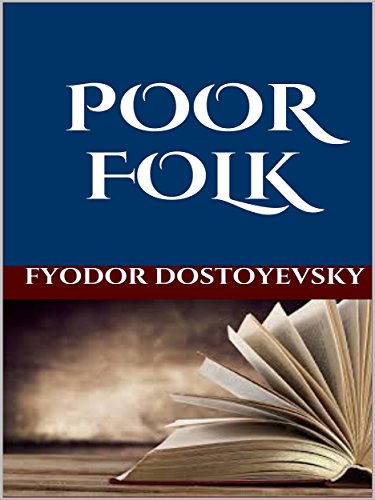-
Poor Folk
Fyodor Dostoyevsky
eBook (GIANLUCA, Dec. 4, 2017)Poor people is the first novel by Fyodor Dostoyevsky, written over a period of nine months between 1844 and 1845 and is written in the form of letters between the two protagonists, Makar Devushkin and Varvara Dobroselova, who are poor second cousins. The novel showcases the lives of poor people, their relationship with wealthy people, and poverty in general.
-
Poor Folk
Fyodor Dostoyevsky
eBook (GIANLUCA, Dec. 4, 2017)Poor people is the first novel by Fyodor Dostoyevsky, written over a period of nine months between 1844 and 1845 and is written in the form of letters between the two protagonists, Makar Devushkin and Varvara Dobroselova, who are poor second cousins. The novel showcases the lives of poor people, their relationship with wealthy people, and poverty in general.
-
Poor Folk
Fyodor Dostoyevsky
eBook (GIANLUCA, Dec. 4, 2017)Poor people is the first novel by Fyodor Dostoyevsky, written over a period of nine months between 1844 and 1845 and is written in the form of letters between the two protagonists, Makar Devushkin and Varvara Dobroselova, who are poor second cousins. The novel showcases the lives of poor people, their relationship with wealthy people, and poverty in general.
-
Poor Folk
Fyodor Dostoyevsky
eBook (GIANLUCA, Dec. 4, 2017)Poor people is the first novel by Fyodor Dostoyevsky, written over a period of nine months between 1844 and 1845 and is written in the form of letters between the two protagonists, Makar Devushkin and Varvara Dobroselova, who are poor second cousins. The novel showcases the lives of poor people, their relationship with wealthy people, and poverty in general.
-
Poor Folk
Fyodor Dostoyevsky
eBook (GIANLUCA, Dec. 4, 2017)Poor people is the first novel by Fyodor Dostoyevsky, written over a period of nine months between 1844 and 1845 and is written in the form of letters between the two protagonists, Makar Devushkin and Varvara Dobroselova, who are poor second cousins. The novel showcases the lives of poor people, their relationship with wealthy people, and poverty in general.
-
Poor Folk
Fyodor Dostoyevsky
eBook (GIANLUCA, Dec. 4, 2017)Poor people is the first novel by Fyodor Dostoyevsky, written over a period of nine months between 1844 and 1845 and is written in the form of letters between the two protagonists, Makar Devushkin and Varvara Dobroselova, who are poor second cousins. The novel showcases the lives of poor people, their relationship with wealthy people, and poverty in general.
-
Poor Folk
Fyodor Dostoyevsky
eBook (GIANLUCA, Dec. 4, 2017)Poor people is the first novel by Fyodor Dostoyevsky, written over a period of nine months between 1844 and 1845 and is written in the form of letters between the two protagonists, Makar Devushkin and Varvara Dobroselova, who are poor second cousins. The novel showcases the lives of poor people, their relationship with wealthy people, and poverty in general.
-
Fyodor Dostoyevsky: The Complete Novels
Fyodor Dostoyevsky
language (Kathartika, June 16, 2020)This book contains the complete novels of Fyodor Dostoyevsky in the chronological order of their original publication.- Poor Folk- The Double- Netochka Nezvanova- The Village of Stepanchikovo- Uncle's Dream- The Insulted and the Injured- The House of the Dead- Notes from Underground- Crime and Punishment- The Gambler- The Idiot- The Eternal Husband- Demons- The Adolescent- The Brothers Karamazov
-
Notes from Underground
Fyodor Dostoyevsky
Paperback (Peach Tree Press, Nov. 11, 2017)NOTES FROM UNDERGROUND is an 1864 novella by Fyodor Dostoyevsky. It is considered by many to be the first existentialist novel. It presents itself as an excerpt from the rambling memoirs of a bitter, isolated, unnamed narrator (generally referred to by critics as the Underground Man) who is a retired civil servant living in St. Petersburg. The first part of the story is told in monologue form, or the underground man's diary, and attacks emerging Western philosophy, especially Nikolay Chernyshevsky's What Is to Be Done?. The second part of the book is called Àpropos of the Wet Snow , and describes certain events that, it seems, are destroying and sometimes renewing the underground man, who acts as a first person, unreliable narrator.
-
The Gambler
Dostoyevsky, Fyodor Mikhailovich Dostoyevsky
Paperback (CreateSpace Independent Publishing Platform, Aug. 18, 2015)The Gambler was written under the pressure of crushing debt. It is a stunning psychological portrait of a young man’s exhilarating and destructive addiction, a compulsion that Dostoevsky–who once gambled away his young wife’s wedding ring–knew intimately from his own experience. In the disastrous love affairs and gambling adventures of his character, Alexei Ivanovich, Dostoevsky explores the irresistible temptation to look into the abyss of ultimate risk that he believed was an essential part of the Russian national character.
-
The Grand Inquisitor
Fyodor Mikhailovich Dostoevsky, Fyodor Dostoyevsky
Paperback (Merchant Books, Dec. 23, 2009)An unabridged extract from Dostoevsky's celebrated Novel, The Brothers Karamazof -
-
Notes from the Underground
Fyodor Dostoyevsky
eBook (Dover Publications, March 5, 2012)In 1864, just prior to the years in which he wrote his greatest novels — Crime and Punishment, The Idiot, The Possessed and The Brothers Karamazov — Fyodor Dostoyevsky (1821–1881) penned the darkly fascinating Notes from the Underground. Its nameless hero is a profoundly alienated individual in whose brooding self-analysis there is a search for the true and the good in a world of relative values and few absolutes. Moreover, the novel introduces themes — moral, religious, political and social — that dominated Dostoyevsky's later works. Notes from the Underground, then, aside from its own compelling qualities, offers readers an ideal introduction to the creative imagination, profundity and uncanny psychological penetration of one of the most influential novelists of the nineteenth century. Constance Garnett's authoritative translation is reprinted here, with a new introduction.